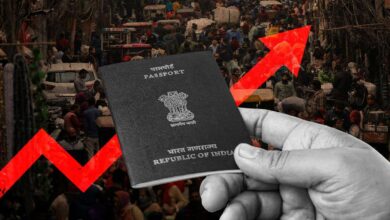Meta Apologises for Inappropriate Auto-Translation: Palestinian Users Labelled as ‘Terrorists’ On Instagram
Meta admits fault in Auto-translation leading to Instagram’s controversial description labelling Palestinian users as ‘Terrorists’ and issues public apology.

Meta Apologises for Inappropriate Auto-Translation: Palestinian Users Labelled as ‘Terrorists’ On Instagram
Instagram’s parent company, Meta, has apologized in public after certain Palestinian users’ profiles were mistakenly branded as “terrorists” due to an error generated by the platform’s auto-translation feature. Users who used the English word “Palestinian” in their bios as well as an emoji of a Palestinian flag and the Arabic word “alhamdulillah” identified the problem.
Bug Alters Profiles: ‘Praise be to God; Palestinian terrorists are fighting for their freedom’
The flaw was discovered after YtKingKhan, a TikTok user, brought attention to it in a video broadcast earlier during the week. In the video, YtKingKhan showed how the Arabic phrase “alhamdulillah” and the English word “Palestinian” might be used to translate to “Praise be to God, Palestinian terrorists are fighting for their freedom.” Users were horrified by this alarming portrayal, which immediately prompted controversy in the neighbourhood.
Social Media Backlash and Apology
Social media users lashed out at the situation, expressing their shock and disgust, and asking how such a degrading translation could have managed to make it to the platform. One commenter voiced their shock by asking, “How did this get pushed to production?” while another conveyed their disbelief by pleading, “Please tell me this is a joke because I cannot comprehend it; I’m out of words.”
In response to the uproar, Meta apologized and informed users that the problem had been fixed. “We fixed a problem that briefly caused inappropriate Arabic translations in some of our products,” a Meta spokeswoman said. We deeply regret that this took place. The firm made it clear that the glitch did not have anything to do with the content’s topic and that it affected all accounts worldwide.

Bug Identified and Rectified
According to Meta spokesperson Andy Stone, the fault was discovered in Stories that re-shared Reels as well as Feed posts, causing them to not display correctly in users’ Stories trays and resulting in dramatically reduced reach. Stone stressed that the glitch affected accounts globally and had nothing to do with the content itself. He reassured users that the issue had been resolved, putting a closure to the controversial translations.
While the immediate problem has been resolved, this episode raises concerns about the possible hazards of automated systems as well as the vital necessity for strict control. Users can only hope that Instagram and other social media platforms will use more caution when deploying such technologies, ensuring that users are dealt with respect and fairness in the online realm. The incident is a sharp reminder of the problems faced by quickly expanding technologies, as well as the responsibility that businesses bear in providing a secure as well as inclusive online environment for all.
Meta Faces Mounting Scrutiny: Calls for Transparency Grow Amidst Allegations of Biased Content Moderation
Facebook and Instagram’s parent company, Meta, is coming under increased pressure for dealing with complaints about its content moderation practices, particularly with relation to content with a Palestinian theme. Palestinian living in Sydney and Electronic Frontiers Australia secretary Fahad Ali expressed his dissatisfaction with Meta’s lack of openness over recent contentious events.
Ali emphasized the urgent necessity to comprehend the causes of what he called “digital biases” in Meta’s platforms. “There is a real concern about these digital biases creeping in, and we need to know where that is stemming from,” he stated. He questioned whether the biases were brought on by automation, problems with the training sets, or human characteristics that were present during the creation of these technologies. Advocates like Ali are looking for more honest explanations because Meta had failed to offer any clear information.

Internal Discontent and External Criticism: Meta Faces Backlash
The recent events had a huge impact on those who worked at the firm, according to a former Facebook employee who was given access to conversations among current Meta employees. According to reports, the problem “pushed a lot of people over the edge” both within and publicly. This sense of dissatisfaction emphasizes how serious the situation is within Meta as well as the concerns of the larger community.
Meta has been accused of restricting pro-Palestinian voices on its platforms, particularly during the conflict between Israel and Hamas. The business has denied intentionally limiting anyone’s voice, citing new anti-harmful content procedures. Meta reported that postings re-shared as reels and posts were not showing up in people’s Instagram stories due to an issue that affected users worldwide, regardless of the subject nature of the content. Furthermore, the business recognized a momentary global outage of its Facebook live video service.
Transparency and Moderation Policies: Questions Raised on Source of Digital Biases
Ali stressed how vital it is for Meta to be more open about its moderating practices, especially with regard to the Palestinian population. “We don’t know where Meta draws a line, and if they are, in fact, infringing upon Palestinian speech,” Ali remarked. He drew attention to Palestinians’ rising worries that their accounts are being targeted unfairly or taken down. Although Meta frequently blames automated moderation for these instances, there is a growing belief that Palestinian voices are disproportionately impacted.
The issue for Meta is to regain the trust of its users, particularly those who come from communities that are underrepresented, as the company struggles with internal unrest, criticism from the outside, and calls for openness. In the upcoming months, the tech giant’s relationship with its consumers will probably be significantly shaped by its capacity to handle these concerns in a manner that is straightforward as well as effective.

Balancing Act for Social Media Giants Amidst Ongoing Conflict
The multinational technology company is now treading a fine line between content moderation as well as free expression in the wake of recent controversy concerning Meta’s handling of Palestinian-related information on its platforms. Important considerations about the function of social media platforms during times of war have been raised by occurrences involving the mislabelling of Palestinian users and the consequent claims of repression.
In the face of widespread disinformation as well as propaganda, particularly when it comes to sensitive geopolitical events such as the Israel-Hamas war, Meta’s claim that it has put mechanisms in place to restrict damaging content is unquestionably crucial. The company’s commitment to prohibiting anything that supports Hamas and any violent or graphic content reflects a need to ensure a secure online environment. The difficulties these platforms confront in finding the correct balance, however, are highlighted by recent bugs and errors that led to the misrepresentation of innocent Palestinian users.
Although the corporation has given justifications and urged people to challenge any incorrect moderation choices, there is still an urgent need for openness. Fahad Ali’s request for clarification on the causes of “digital biases” matches a feeling that is widely held: people should be aware of how these automated systems operate as well as what protections are in place to prevent inadvertent biases. The pressure on social media sites to stop the dissemination of false and misleading content has increased as a result of the ongoing Israel-Hamas conflict. The importance of the influence social media platforms like Facebook, Instagram, as well as Twitter have on influencing public opinion is highlighted by prominent voices calling for strict action from these platforms.
In conclusion, it is critical for tech businesses to not only maintain strict content moderation procedures but also to assure transparency, accountability, as well as fairness as online platforms become more and more entwined with world events. It is undoubtedly difficult to strike a careful balance between limiting damaging content and protecting the right to free expression. Social media behemoths may overcome these obstacles and play a vital role as providers of factual information and responsible debate in the digital era by engaging in open discussion, soliciting user feedback, as well as communicating clearly.




